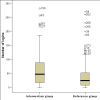Psychophysiological effects of a web-based stress management system: a prospective, randomized controlled intervention study of IT and media workers [ISRCTN54254861]
- PMID: 16042796
- PMCID: PMC1183223
- DOI: 10.1186/1471-2458-5-78
Psychophysiological effects of a web-based stress management system: a prospective, randomized controlled intervention study of IT and media workers [ISRCTN54254861]
Abstract
Background: The aim of the present study was to assess possible effects on mental and physical well-being and stress-related biological markers of a web-based health promotion tool.
Methods: A randomized, prospectively controlled study was conducted with before and after measurements, involving 303 employees (187 men and 116 women, age 23-64) from four information technology and two media companies. Half of the participants were offered web-based health promotion and stress management training (intervention) lasting for six months. All other participants constituted the reference group. Different biological markers were measured to detect possible physiological changes.
Results: After six months the intervention group had improved statistically significantly compared to the reference group on ratings of ability to manage stress, sleep quality, mental energy, concentration ability and social support. The anabolic hormone dehydroepiandosterone sulphate (DHEA-S) decreased significantly in the reference group as compared to unchanged levels in the intervention group. Neuropeptide Y (NPY) increased significantly in the intervention group compared to the reference group. Chromogranin A (CgA) decreased significantly in the intervention group as compared to the reference group. Tumour necrosis factor alpha (TNFalpha) decreased significantly in the reference group compared to the intervention group. Logistic regression analysis revealed that group (intervention vs. reference) remained a significant factor in five out of nine predictive models.
Conclusion: The results indicate that an automatic web-based system might have short-term beneficial physiological and psychological effects and thus might be an opportunity in counteracting some clinically relevant and common stress and health issues of today.
Figures



References
-
- Lecrubier Y. The burden of depression and anxiety in general medicine. J Clin Psychiatry. 2001;62 Suppl 8:4–9; discussion 10-1. - PubMed
-
- Murray CJL, Lopez AD, World Bank. World Health Organization. Harvard School of Public Health . Global burden of disease and injury series, 1. Cambridge, Mass. , published by the Harvard School of Public Health on behalf of the World Health Organization and the World Bank distributed by Harvard Univ. Press; 1996. The global burden of disease : a comprehensive assessment of mortality and disability from diseases, injuries, and risk factors in 1990 and projected to 2020; p. 990.
-
- Fox S, Fallows D. Internet Health Resources: Health searches and email have become more commonplace, but there is room for improvement in searches and overall Internet access. Washington DC , PEW INTERNET & AMERICAN LIFE PROJECT; 2003. p. 42.
Publication types
MeSH terms
Substances
Associated data
LinkOut - more resources
Full Text Sources
Medical
Research Materials
Miscellaneous

